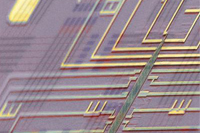Boffins develop first programmable nanoprocessor
The scientific breakthrough could lead to the creation of nanoprocessors with greater scalability and functionality.


Researchers have developed the world's first programmable nanoprocessor, which could open up possibilities for adding intelligent functionality and greater scalabiilty to circuits but using a fraction of the space.
The breakthrough is the result of a collaboration between teams at Harvard University and MITRE, who have used nanowire tiles to carry out both arithmetic and logical functions. In practice, it will mean much more advanced computer circuitry can be produced on a nano scale.
"This work represents a quantum jump forward in the complexity and function of circuits built from the bottom up, and thus demonstrates that this bottom-up paradigm, which is distinct from the way commercial circuits are built today, can yield nanoprocessors and other integrated systems of the future," said Charles Lieber, who led the project and who also serves a dual role at Harvard's Department of Chemistry and Chemical Biology and School of Engineering and Applied Sciences.
"For the past 10 to 15 years, researchers working with nanowires, carbon nanotubes, and other nanostructures have struggled to build all but the most basic circuits, in large part due to variations in properties of individual nanostructures. We have shown that this limitation can now be overcome and are excited about prospects of exploiting the bottom-up paradigm of biology in building future electronics."
Furthermore, these advanced circuits will also use much less power than traditional components thanks to the use of nonvolatile transistor switches.
"Because of their very small size and very low power requirements, these new nanoprocessor circuits are building blocks that can control and enable an entirely new class of much smaller, lighter weight electronic sensors and consumer electronics," added Shamik Das, lead engineer in MITRE's Nanosystems Group and co-author of the research.
Get the ITPro daily newsletter
Sign up today and you will receive a free copy of our Future Focus 2025 report - the leading guidance on AI, cybersecurity and other IT challenges as per 700+ senior executives
Maggie has been a journalist since 1999, starting her career as an editorial assistant on then-weekly magazine Computing, before working her way up to senior reporter level. In 2006, just weeks before ITPro was launched, Maggie joined Dennis Publishing as a reporter. Having worked her way up to editor of ITPro, she was appointed group editor of CloudPro and ITPro in April 2012. She became the editorial director and took responsibility for ChannelPro, in 2016.
Her areas of particular interest, aside from cloud, include management and C-level issues, the business value of technology, green and environmental issues and careers to name but a few.
-
 Should AI PCs be part of your next hardware refresh?
Should AI PCs be part of your next hardware refresh?AI PCs are fast becoming a business staple and a surefire way to future-proof your business
By Bobby Hellard Published
-
 Westcon-Comstor and Vectra AI launch brace of new channel initiatives
Westcon-Comstor and Vectra AI launch brace of new channel initiativesNews Westcon-Comstor and Vectra AI have announced the launch of two new channel growth initiatives focused on the managed security service provider (MSSP) space and AWS Marketplace.
By Daniel Todd Published